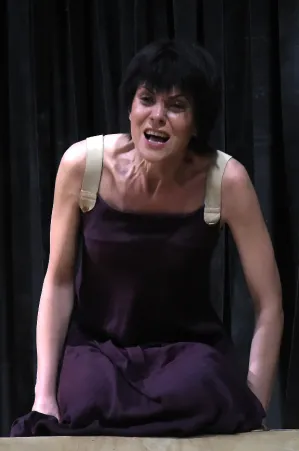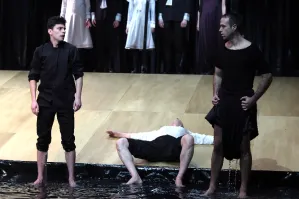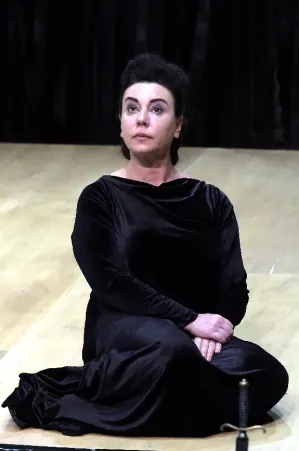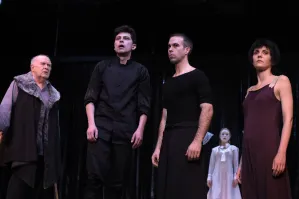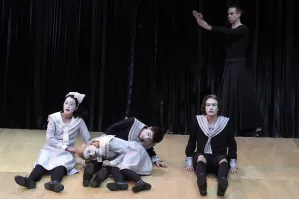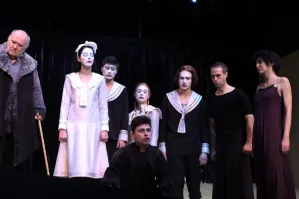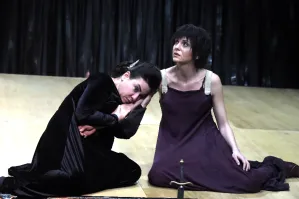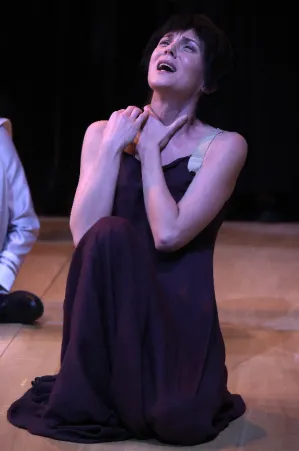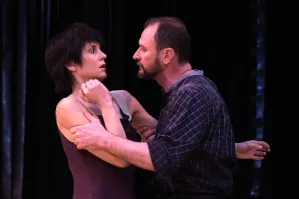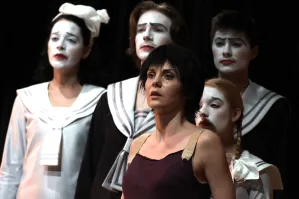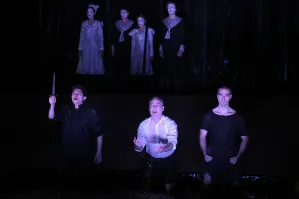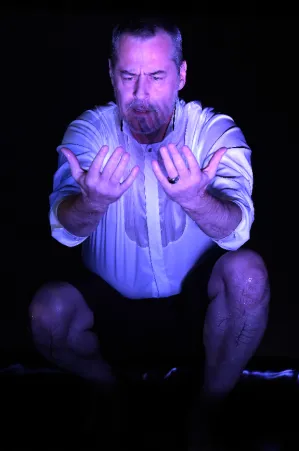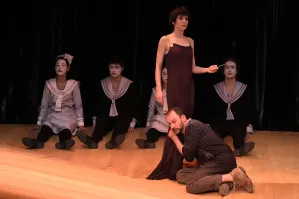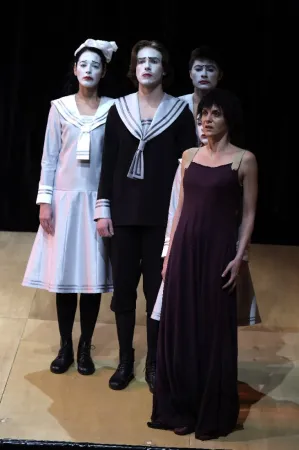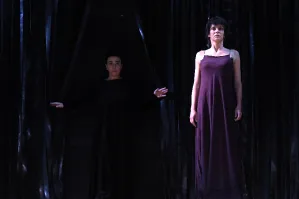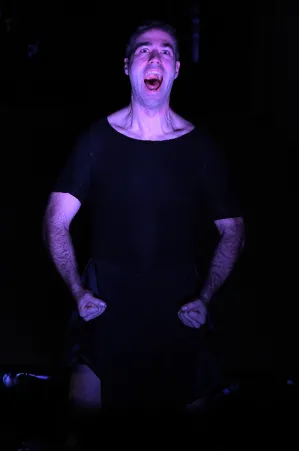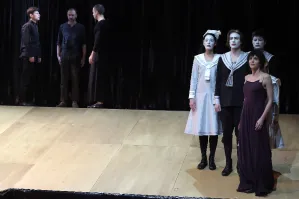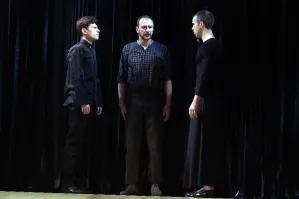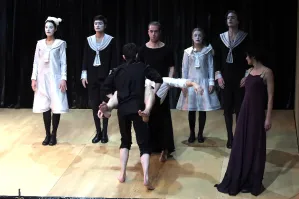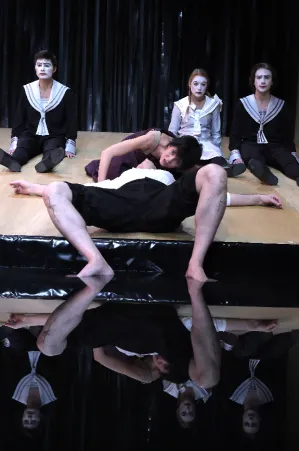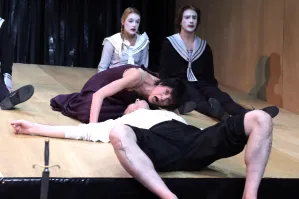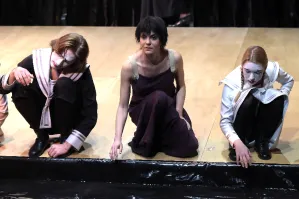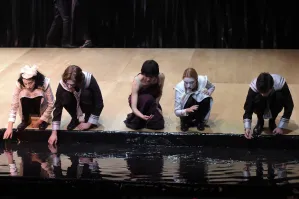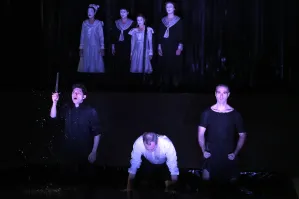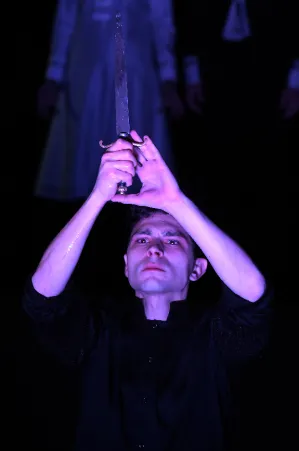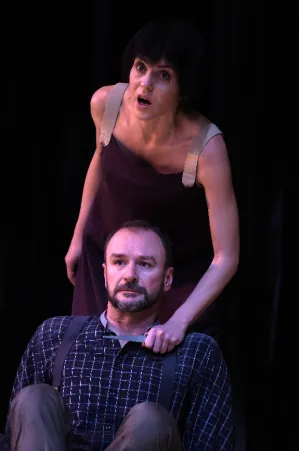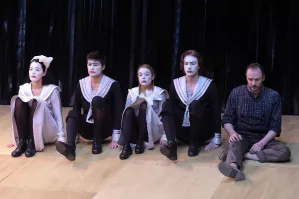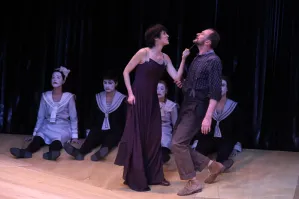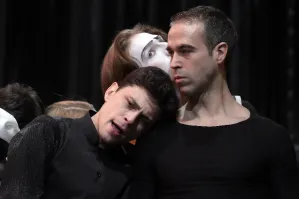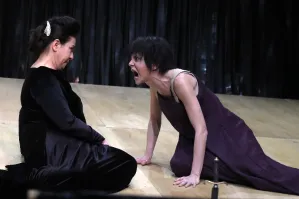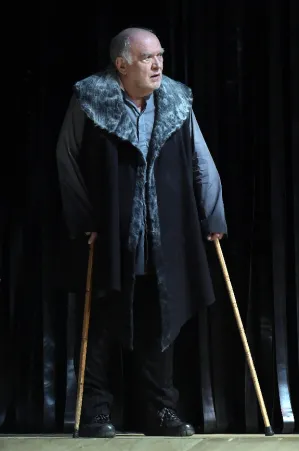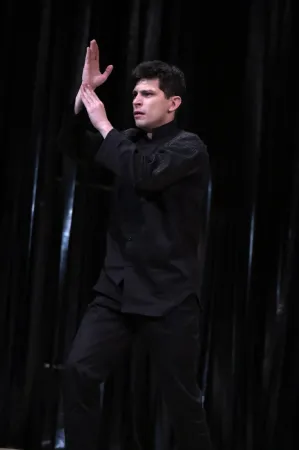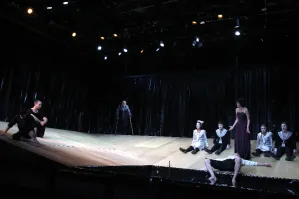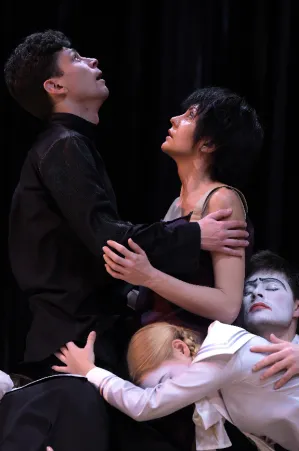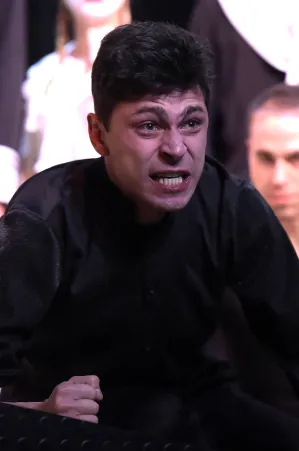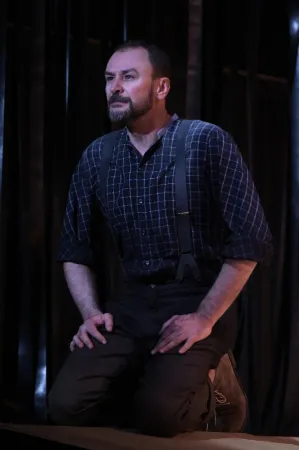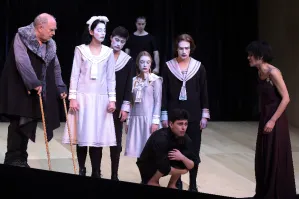Electra
drama by Danilo Kiš

Electra (based on tragedy by Euripides) was written in 1968 (it premiered in the Atelje 212 Theatre the same year, on 12th November). Appropriately titled for the event as Electra 69, the play was performed outside the competition at the BITEF Theatre Festival on 4th September 1969. The performance marked the end of Kiš’s cooperation with the Atelje 212 Theatre, which started in 1965. He used experience gained as a dramaturge and wrote three television plays (Night and Fog, The Parrot, Thomas Wolfe’s Wooden Casket) and the dramatisation of a short story A Tomb for Boris Davidovich. These, together with Electra, form the whole drama opus by Kiš, where we also should add numerous translations of plays (Corneille The Cid, Molière Dom Juan, Musset’s “dramatic proverb” One Should not Play with Love, dramatization of de Sade’s Philosophy in the Boudoir, The Last Day of a Man Condemned to Death by J-H. Tisserant, Labiche’s The Piggy Bank, Feydeau’s A Cat in a Bag, Sartre’s The Trojan Women and Forlani’s War and Peace at the Café Snaffle). This is sufficient evidence of his love for theatre, of which he intended to write judging by the notes from 1978 (see The Depository). On the very reason he wrote Electra, about dramaturgical interventions and language style solutions, Kiš himself wrote for the theatre programme in the note On Electra. There is nothing to add to it. Let’s just state that range of his ‘free association over a dramatic text’, as he labelled his work, can be assessed only in comparison to Euripides’ original text. Only then, it can be seen that based on Euripides’ tragic scheme, according to the logic of translation into another language, into existence comes not merely an individual poetic creation of first class (where dramatic tension arises from its lexical, syntax and rhythmic potential), but a tragedy of different psychological and ethical nature. (Changes in it are more radical, while the poetic ranges are far more superior to the ones in Sartre’s Trojan Women, which is also based on the eponymous tragedy by Euripides.)
M(irjana) M(iočinović), Prologue, in: Poetry, Electra, Arhipelag, Belgrade, 2014
ON ELECTRA
This is, as far as I know, sixteenth or seventeenth version of the theme of Electra. In the ancient times, this ‘tremendously sorrowful play’ was worked on by Euripides, Aeschylus in The Choepori, and later on by Atilius and Cicero’s brother. After the Renaissance, the theme becomes very attractive for the French: Prosper Jolyot de Crébillon publishes his Electra in 1708, Voltaire wrote Orestes in 1750, Leconte de Lisle wrote The Erinyes in 1837 (based on Aeschylus’ play), while in the twentieth century, a hundred years after de Lisle, Jean Giraudoux becomes successful with his Electra (1937). German writers also wrote about the theme: J. Jacob Bodmer in the play Electra or Avenged Murder (1760), W. Gotter in Orestes and Electra (1772); A. Ehlert in Clytemnestra (1881), G. Siegert also in Clytemnestra (1879) and Hugo von Hofmannstahl in Electra (1904). In addition, there have been an Italian, Alfieri (Orestes, 1786), a Spaniard, Benito Perez Galdos (Electra, 1904), and recently, in our country, Jovan Hristić wrote a quite modern variation to this classical theme. Miloš Đurić (let us, as always when classical themes are concerned, mention his name) states that Electra by Sophocles, was translated into our language by Dominko Zlatarić in 1597, and that this has been the first great work of Hellenic literature translated into our language.
*
When it was decided that the Chamber Stage in the Atelje 212 Theatre would place in its repertory a classical play in a contemporary staging conception, and when it was decided that the play would be Electra by Euripides, there was an immediate issue of adaptation. (In the essence of the play, therefore, is a linguistic problem – which would doubtlessly delight the structuralists!) Namely, the one translation, by Koloman Rac, which was used for generations, proved to be completely unsuitable for the modern stage speech. Probably the only quality of the translation, its metrical consistency with the original, turned out to be unmanageable – the text was huge and, occasionally, almost completely incomprehensible. However, when the Theatre commissioned an expert on Hellenic literature to translate Electra, again (to the delight of structuralists!) there was an essential problem regarding the language. Namely, the translator insisted on metrical consistency with the original, where he was doubtlessly on the mark, but he also insisted on differences in speech regarding the characters. He suggested that some of the characters should be clearly distinguished between by their dialects and, if I remember correctly, according to his suggestion the Peasant (or in my play, the Mason) would speak with Bosnian dialect, while Electra, on the other hand, would speak… etc. The Theatre management asked me to ‘translate’ the translation by Koloman Rac or in other words, to adapt the play. I instantaneously realised that the job would be laborious and futile. Therefore, when I approached the text by Koloman Rac with innocence of a non-expert, or should I say with gullible naiveté of a poet, I started to write my own lines, or more precisely my own stanzas, by keeping only the essential line of thought in the beginning. This sort of free association, the pleasure of it, was similar to what I proposed to some of my friends, the poets (true ones!), who spoke fluent French: I proposed them to take verses by Spanish poets and translate them through instinctively felt framework of sense – without looking the words up in a dictionary! Later on, inspired by this game, although being careful not to go too far from the original (because, after all, I was being paid to adapt Electra by Euripides), I, metaphorically speaking, started adding various parentheses, transforming monologues into dialogues, ‘opening up’ scenes, thus transferring indirect speech into direct stage action, etc. Of course, this sort of free association over a drama text had to lead to changes in characters; the changes were not limited only to the emphasis of their personalities. Thus, there was a problem of introducing psychological nuances. Although Euripides had been the most prone to psychological distinction amongst classical Greek dramatists, still the psychology of his characters had been the psychology of his time, which is quite clear. Therefore, the laws of divine ethics, or in other words – the laws of ambiguous divine mechanics, had conditioned characters’ psychology in his play. Of course, I have kept the gods by trying to reduce them to anthropodicy, to ‘divinity in a man’s heart’. When choruses are concerned, it is well known that choruses were Euripides’ weakness; Aristotle criticised him for simply inserting the choruses into the play instead of having them emerge from the plot. By searching his choruses for essence, those rare connections to the plot, I tried to introduce variants of several themes, which a director could use as ‘songs’, as it is called in today’s theatre jargon. As far as Pylades is concerned, since he is represented merely as Orestes’s shadow and companion, which can be sensed in Euripides’ play where he has but a few insignificant lines, I reduced him to his rightful measure – he became a shadow of a man, a ‘thug’ or ‘faint-hearted’, a mute; I saw him as a clumsy deaf and mute slave who acts on stage, especially in bloody and tragic scenes, as a creepy and ghastly person, maybe sensitive and terrified, but nonetheless a cruel and terrifying character in his helpless howling and mumbling, in his ridiculous struggle and his blind obedience to Orestes’s will. Finally, maybe he could be seen as the only positive character in this bloody drama, a silent observer and an unintentional participant. Could he be, perhaps, the Orestes’s double, his positive and helpless alter ego, his consciousness? Perhaps, this could be indicated by a mask, a quasi-ancient-Greek mask. Other characters speak for themselves to a director, I believe, and I pray that they would be in his mercy and vice versa. When dedication to Artaud is concerned, it should give an obligation to a director in a measure it was an obligation to me. This means – a lot. Doubtlessly, this play should be portrayed with full measure of brutality. I have to add only this: when watching Kakogiannis’s film Electra, with outstanding Irene Papas in the title role, I noticed, and I believe I was right, that in burial ceremonies, in roughness of stone and faces, in lamentations, in surroundings and the climate, in the sunshine and in people’s hearts, a certain similarity with spiritual landscape and brutal moral climate that could be associated with traditional Montenegro. Perhaps, this is why there are so many decametric verses, curses and lamentations?
In Belgrade, March 1968
D(anilo) K(iš)
Poetry, Electra, Arhipelag, Belgrade, 2014
 IVA MILOŠEVIĆ
IVA MILOŠEVIĆ
Iva Milošević graduated from the Department of Stage and Radio Directing at the Faculty of Drama Arts in Belgrade. Her first job as a stage director was the production of Magic Afternoon by Wolfgang Bauer for the BITEF Theatre Milošević stage directed the following plays: The Marathoners’ Victory Lap by Dušan Kovačević (Satirical Theatre Kerempuh, Zagreb), Shopping and Fucking by Mark Ravenhill, Wrecks by Neil LaBute, Phaedra’s Love by Sarah Kane, The Play about Mirjana and Those Around Her by Ivor Martinić, From the Heroic Life of the Bourgeois by Carl Sternheim, The Dragonslayers by Milena Marković (Yugoslav Drama Theatre); Kasimir and Karoline by Ödön von Horvath (National Theatre Sombor); Road to Nirvana by Arthur Kopit, Snake Pit by Vasily Sigarev, The Celebration by Thomas Vinterberg and Morgens Rukov, The Auditor by N. Gogol (Atelier 212 Theatre); The Little Mermaid by H. C. Andersen and Srdjan Koljević and The Princess and the Pea by Neda Radulović (Little Theatre “Duško Radović” ); The Wolf and the Seven Kids by the Grim Brothers / Ljubinka Stojanović (“Pinocchio” Puppet Theatre); The Princess and the Frog by H. C. Andersen / Igor Bojović, Cinderella by Igor Bojović (“Boško Buha” Theatre); Painkillers by Neda Radulović, Misanthrope by Molière (joint stage directing with Gorčin Stojanović) (Serbian National Theatre); Gloria by Ranko Marinković (Terazije Theatre); The Miracle in Šargan by Lj. Simović (NT Užice); Much Ado About Nothing by W. Shakespeare (“Vojdan Černodrinski” National Theatre, Prilep, Macedonia); Magic Afternoon by Wolfgang Bauer (Bitef Theatre). She is the recipient of “Bojan Stupica” and “Ljubomir Muci Draškić” awards for directing, as well as the annually presented awards for directing at the Serbian National Theatre and Yugoslav Drama Theatre. With her plays she took part in festivals in Stuttgart (Germany), Bogotá (Colombia), San Jose (Costa Rica), Guadalajara (Mexico), Sibiu (Romania), Madrid, Rome, Prague, Rijeka, Split, Umag, Sarajevo, Brčko, Banja Luka, Kotor and Budva, as well as in all renowned Serbian festivals.
A NOTE BY THE STAGE DIRECTOR AT THE FIRST REHEARSAL
For me Electra is a story about cruelty caused by vulnerability, about hatred caused by pain. The play makes one think about a specific situation and emotions incited by the situation. There is trauma. There is frustration. There are emotional losses. Brutal killing of Agamemnon and exile from the world that belonged to them caused such wounds in Electra, Orestes and Strophius, that they became ruled exclusively by their rage. They breathe rage and feed on it. It seems that there is a reservoir of rage in their souls and, when the level of rage drops, it is being filled up all over again. Thus, they become emotionally connected. The faith has given them a trauma they cannot overcome. They are incapacitated. Their thoughts and emotions are narrowed down. They only live for the act of revenge. They live only for the moment when they can feel that “AT LAST!” has come. Tragedies mainly deal with the MYSTERY OF RIGHT TIMING: we witness a process made from causes and effects. We focus on the terrible moment when the attacker and the VICTIM are together; when there are actions and suffering and when someone is SCARRED FOR LIFE. Electra is THE ONE WHO WAITS. It is WAITING FOR fulfilment. It is an experience of a particular waiting. Such waiting means SUFFERING. She waits for the moment when she would be able to feel “AT LAST”. Hers is a life accompanied by relentless ticking of a clock. In such a life, in such waiting, there are two types of time. The first one consists of decisions, plans and action; while the second one consists of patience, pain and waiting. Essential emotion that governs Electra is HATRED. What is hatred? Hatred is connected with an object of dissatisfaction. It spurs from the survival instinct that has been challenged. Hatred is a force of destruction and degradation, a force of deprivation and death. In hatred, aggressiveness and cruelty become connected with the feeling of contentment and pleasure. They can lead to the state of delight and excitement. Electra is governed by hatred, she is enchanted by hatred; she nourishes it and spurs it on because she had become addicted to it, since hatred is the only thing that drives her life. She wants revenge because of hatred within and because she feels that it would satisfy justice. Namely, she feels that it would give her the long awaited feeling of “AT LAST”. She has been A LIVING DEAD for a very, very long time. The issue of justice is unfathomable. Striving for justice results in bloodbath. Electra actually strives for bloodbath. She believes that the bloodbath would soothe the pain she had had for such a long time. She sees her brother as an instrument of justice. However, the plan Orestes realises would never ease the pain. On the other side, the tragedy places the phenomenon of RAGE into the limelight, as the most brutal and most human feeling at the same time. RAGE enables us to show what we have, what we can, what we are and what we want to be. RAGE is the fuel which drives people to fight for dignity. Instead of remaining inactive when faced with injustice, a person has the ability and possibility to do something and thus rise above unalterable and permanent role imposed on him if he sees himself only as a part of nature in which everything is fixed and finalized, and rise towards the gods who are far more powerful and free. A person cannot reach gods, but owing to RAGE and will to act, he can go half the way. Therefore, people have natural sense of dignity and justice. Ancient Greek celebrated and contemplated RAGE. Today’s, modern consumerism encourages switching the RAGE and pride off in a man by buying off interest for dignity with material benefits. Nonetheless, it does not mean that RAGE, as a dark and magnificent force in a man, has absolutely vanished. A modern man simply has a different rapport to it. How does it feel to perform a tragedy? One of the strongest beliefs is that tragedy came from ritual and that it owes the most important part of its influence on viewers to the preserved elements of rituals. Rituals are ultimately meaningful and important in the life of a community. They ask some of the ultimate questions regarding a man’s life and they answer them, while a man is placed in almost direct contact with forces believed to influence his life; those forces reveal that life is not merely an amorphous series of events, instead they expose that the events have meaning and purpose. With this in mind, tragedies possess something in common, or at least, similar with rituals, but it is not their form that follows a form of an imaginary ritual, it is the fact that tragedies place us in immediate contact with forces that govern our lives, of which we are not always conscious. It is certain that the Greek have not portrayed classically styled figures instead of live people who are overcome with pain and passions. When a tragedy finishes, something happens to us. Are we merely calm, or are we liberated from passions which made the tragedy’s heroes perform atrocious crimes, or are we capable to bear the atrocities we saw on stage when they happen in our lives, or have we reached a conclusion about the world we live in? It is a question every viewer answers for himself, and he has the right to make that decision, but nobody can contradict that they were influenced by something either very simple or something quite complex, depending on what their souls were burdened with when they came to theatre.
Premiere performance
Premiere 25th December 2016 / “Raša Plaović" Stage
Stage Director Iva Milošević
Set Designer Gorčin Stojanović
Costume Designer Boris Čakširan
Composer Vladimir Pejković
Stage Speech Ljiljana Mrkić Popović
Executive Producer Ivana Nenadović
Organiser Nemanja Konstantinović
Premiere Cast:
Electra Nada Šargin
Orestes Marko Janketić
Pylades Pavle Jerinić
Mason Aleksandar Đurica
Strophius Branko Jerinić
Aegisthus Darko Tomović
Clytemnestra Dušanka Stojanović Glid
Chorus: Mina Nikolić*, Bojana Đurašković*, Joakim Tasić*, Dragan Sekulić*
Musician Vladimir Pejković
*Students of the Faculty of Drama Arts and the Academy of Arts
Stage Manager Miloš Obrenović
Prompter Jelena Halupa
Assistant Stage Director Miljana Ćosić*
Assistant Set Designer Dunja Kostić
Assistant Costume Designer Ana Vukašinović
Organiser in training Milica Mladenović*

